Daniel M. Bensen's Blog, page 39
January 27, 2019
Wheeler!

Look at this lovely glasslands wheeler Joschua Knüppe drew on an alien art stream! I’m glad he’s enjoying Junction.

January 24, 2019
Alternatives to water?
Here’s an old old specbio question.
We on Earth are made of fat suspended in sugary seawater. That is, phospholipids, with one pole salty and water-loving and the other pole oily and water-hating, surround blobs of water to form cells. The water dissolves sugars, which are useful as fuel, building material, and data storage, and suspends proteins, which do work. Water is useful in this way, because it’s relatively non-reactive, but it’s polar, so it separates molecules from each other without ripping them apart.
How could things be different? What about sulfur dioxide as an alternative? Hydrogen sulfide? Both are polar but non-reactive. Acetic acid is polar, although rather reactive. Silicones are non-reactive. Are polar silicones possible? Acetic acid and silicon also have the useful properties of decreasing in density when they freeze (like ice does in water). Ammonia has a higher specific heat capacity than water (useful for regulating a planet’s temperature), and it’s also polar, although it is more reactive than water.
Ammonia is very tempting, since I’m working on low-temperature biomes right now. But which other solvents do you think are worth digging into? Are there any I missed?

January 23, 2019
Alternatives to water 2: water…vapor?
This post is a sequel to this one about alternatives to water-based biochemistry.
Or maybe a side-quel, because actually I am talking about water. Water vapor!
Imagine a cloud of droplets, each with some sugars dissolved in it, each surrounded by a phospholipid shell. Proteins link one droplet to another. It’s an inside-out cell.
According to atopics, droplets in clouds, fog, and mist, range from 1 to 100 microns in diameter, which would comfortably fit anything from bacterial cells (3-5 microns) to mammal cells (50 microns). Raindrops are 1,000 microns in diameter, and living droplets could grow even larger without falling (by, for example shaping themselves into parachutes, or by directing force applied by the wind from one part of the cloud to another, or by chemical propellants, or focusing sunlight to produce heat). So the scales work. I think the challenge will be in the composition of the microtubules that connect one droplet to another. I’ll look up strong, light polymers. 
January 20, 2019
January Thaw
January thaw
Snow melts into the black ground
The smell of wet soil

Axes of Assymetry
I read Your Inner Fish and got inspired for a new creature:)
So we humans are bilaterally symmetrical, with a functional difference between front and back, and another between back and belly. But there’s no functional difference between left and right. In the same way, jellyfish have a difference between up and down, but no front versus back.
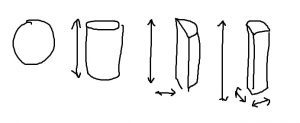
What if we had an animal with three axes of asymmetry? Right vrs. left is as different as back-vrs.-front and top-vrs-bottom. But while it’s easy to see why a worm crawling along the ocean floor would evolve a head and a belly, why would it evolve a specialized structure on its right as opposed to its left side? What force could there be that always acts on an animal orthogonally to gravity and its direction of motion?

January 17, 2019
Word Craft: my interview with J.D. Moyer
J.D. Moyer, author of Sky Woman, was kind enough to interview me for his Word Craft series. Here’s the interview, we talk about The Balkan Tower of Matriarchy, revisions, and my work space. Check it out 
January 13, 2019
Steam on the Windows
Steam on the windows
And the snowy air beyond
The radiator

January 11, 2019
Writing Wrongly
January 10, 2019
Junction is out!
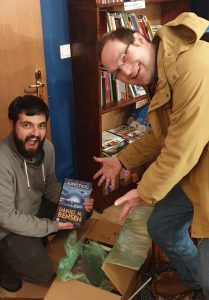
Me and Bulgaria’s Khan of Horror and Prince of Translation, Emil Minchev
Junction is out! You can buy it at Amazon, Barnes and Nobel, and everywhere else in the Anglosphere. Soon, we shall invade the other spheres, as well.
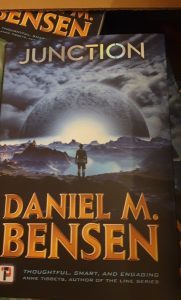
Look at that rainbow sheen!
240 pages, ~90,000 words, first line: Daisuke Matsumori faked a smile and held out a dead mouse. The little corpse dangled by its tail, its eyes closed, its toes clenched, observed by the cassowary.
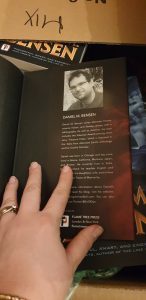
These books are extremely pretty
Begun: late July 2015 at Belchin hosprings, Bulgaria
First draft done: February 3rd 2016 in Sofia, Bulgaria
Second draft done: December 28th 2016 in Borovets, Bulgaria
Third draft done: February 28th 2017 in Sofia, Bulgaria
Third draft picked up by Flame Tree: April 9th 2018
Fourth draft finished: late August 2018 in Mountain View, California
Copy edits finished: late September 2018 in Missoula, Montana
final edits on Advance Reader Copy: mid-October 2018 in Sofia
Launch: January 10th 2019 7pm at Fox Book Cafe ul. “William Gladstone” 32, 1000 Sofia Center, Sofia (you’re invited!)
Thank you, everyone, for staying with me on this long and wild ride.
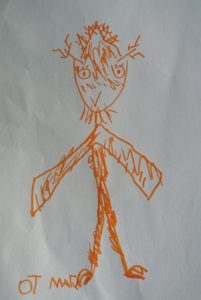
My daughter is also getting into the family specbio business
Other Junction pictures, process notes, and more

January 9, 2019
The 7th Day of Junction: Q&A with me
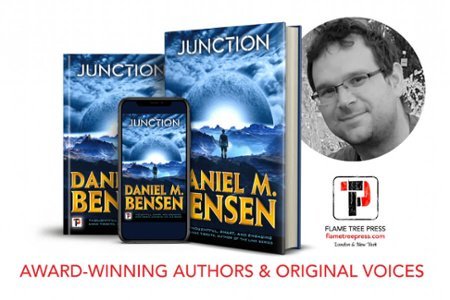
My publisher, Flame Tree, did an interview with me, which they released yesterday. Click here to read about Junction, its underlying themes, my process, how I made the monsters, and what was going on in my real life at the time.





